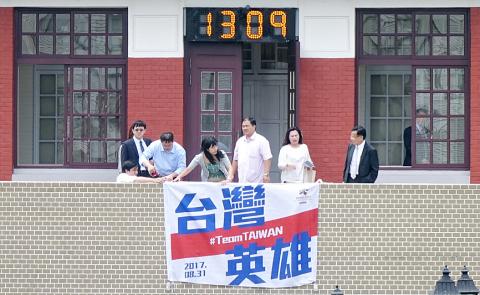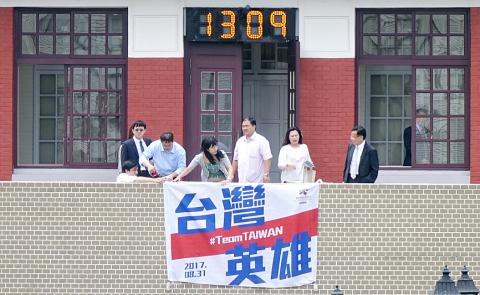Lawmakers yesterday passed amendments to the National Sports Act (國民體育法), which include articles aimed at eliminating nepotism and barring political influence within sports associations amid calls to reform the sports sector.
The amendments include an article stipulating that sports association presidents cannot have terms that exceed four years and must not serve more than two consecutive terms.
The article states that at least one-fifth of sports association members should be active or former athletes of the national sports team, while neither independent directors nor directors representing organizations should make up more than half of membership.

Photo: Liu Hsin-de, Taipei Times
In a bid to root out nepotism, something associations have been accused of, the amendments ban presidents and secretaries-general from hiring spouses or relatives within the third consanguinity, and the rule is to apply even if they were hired before the top officials took up their role.
The Ministry of Education, which oversees sports associations, is to inspect and evaluate them annually, the amendments state, adding that associations must comply with inspections and provide any requested information.
The amendments include rules on arbitration to deal with disputes between associations and athletes.

Photo: Liu Hsin-de, Taipei Times
According to the amended act, athletes protesting a decision made by an association can file for arbitration with any institute certified by the ministry within a given period and the association cannot deny them that right.
To help ensure financial transparency, the amendments mandate that sports associations truthfully disclose annual budgets, balances and subsidies they receive from government agencies.
The amended act also requires associations to introduce internal audit systems.
Democratic Progressive Party Legislator Huang Kuo-shu (黃國書), who introduced several draft amendments and was instrumental to the legislative effort, said that the passage of the amendments was a gift to athletes who competed for Taiwan at the Taipei Summer Universiade, which concluded on Wednesday; all the athletes who have been treated unfairly due to red tape; and all rising sports stars.
“Over the years, athletes have had to put up with the frustration of submitting to pressure from insulated and conservative associations that have the right to decide who represents the nation at international events,” Huang said.
“I hope that from now on, athletes and associations will no longer have to compromise for the nation,” he said.

OPTIMISTIC: The DGBAS sharply upgraded its GDP growth estimate from 3.54 percent to 7.71 percent after the Taiwan-US trade agreement signing and given AI optimism The US imported more from Taiwan than China for the first time in decades, as US President Donald Trump’s tariffs reshape trade flows while a global boom in artificial intelligence (AI) fuels demand for tech products. US purchases of goods from China plunged almost 44 percent in December last year from 2024 to US$21.1 billion, US Department of Commerce data showed on Thursday. By contrast, shipments from Taiwan more than doubled during the same period to US$24.7 billion. The soaring Taiwanese shipments to the US reflect the huge expansion in supplies of chips and servers for AI companies, which has completely changed

The Central Election Commission has amended election and recall regulations to require elected office candidates to provide proof that they have no Chinese citizenship, a Cabinet report said. The commission on Oct. 29 last year revised the Measures for the Permission of Family-based Residence, Long-term Residence and Settlement of People from the Mainland Area in the Taiwan Area (大陸地區人民在台灣地區依親居留長期居留或定居許可辦法), the Executive Yuan said in a report it submitted to the legislature for review. The revision requires Chinese citizens applying for permanent residency to submit notarial documents showing that they have lost their Chinese household record and have renounced — or have never

US and Chinese fighter jets briefly faced off above waters near the Korean Peninsula this week, Yonhap News agency reported, marking a rare confrontation in that area between the two superpowers. About 10 US fighter jets on Wednesday departed an airbase in Pyeongtaek, South Korea, for drills above international waters off South Korea’s western coast, the news outlet cited unidentified military sources as saying. While the US planes did not enter China’s air defense identification zone, Beijing scrambled planes as they neared that region, the report said. “The Chinese People’s Liberation Army organized naval and air forces to monitor and effectively respond

Taiwan has secured another breakthrough in fruit exports, with jujubes, dragon fruit and lychees approved for shipment to the EU, the Ministry of Agriculture said yesterday. The Animal and Plant Health Inspection Agency on Thursday received formal notification of the approval from the EU, the ministry said, adding that the decision was expected to expand Taiwanese fruit producers’ access to high-end European markets. Taiwan exported 126 tonnes of lychees last year, valued at US$1.48 million, with Japan accounting for 102 tonnes. Other export destinations included New Zealand, Hong Kong, the US and Australia, ministry data showed. Jujube exports totaled 103 tonnes, valued at